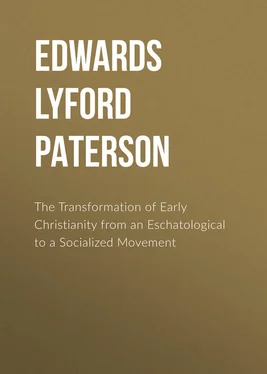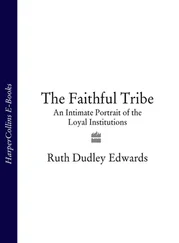Lyford Edwards - The Transformation of Early Christianity from an Eschatological to a Socialized Movement
Здесь есть возможность читать онлайн «Lyford Edwards - The Transformation of Early Christianity from an Eschatological to a Socialized Movement» — ознакомительный отрывок электронной книги совершенно бесплатно, а после прочтения отрывка купить полную версию. В некоторых случаях можно слушать аудио, скачать через торрент в формате fb2 и присутствует краткое содержание. Жанр: foreign_religion, foreign_antique, foreign_prose, на английском языке. Описание произведения, (предисловие) а так же отзывы посетителей доступны на портале библиотеки ЛибКат.
- Название:The Transformation of Early Christianity from an Eschatological to a Socialized Movement
- Автор:
- Жанр:
- Год:неизвестен
- ISBN:нет данных
- Рейтинг книги:4 / 5. Голосов: 1
-
Избранное:Добавить в избранное
- Отзывы:
-
Ваша оценка:
- 80
- 1
- 2
- 3
- 4
- 5
The Transformation of Early Christianity from an Eschatological to a Socialized Movement: краткое содержание, описание и аннотация
Предлагаем к чтению аннотацию, описание, краткое содержание или предисловие (зависит от того, что написал сам автор книги «The Transformation of Early Christianity from an Eschatological to a Socialized Movement»). Если вы не нашли необходимую информацию о книге — напишите в комментариях, мы постараемся отыскать её.
The Transformation of Early Christianity from an Eschatological to a Socialized Movement — читать онлайн ознакомительный отрывок
Ниже представлен текст книги, разбитый по страницам. Система сохранения места последней прочитанной страницы, позволяет с удобством читать онлайн бесплатно книгу «The Transformation of Early Christianity from an Eschatological to a Socialized Movement», без необходимости каждый раз заново искать на чём Вы остановились. Поставьте закладку, и сможете в любой момент перейти на страницу, на которой закончили чтение.
Интервал:
Закладка:
Lyford P. Edwards
The Transformation of Early Christianity from an Eschatological to a Socialized Movement / A Dissertation Submitted to the Faculty of the Graduate School of Arts and Literature in Candidacy for the Degree of Doctor of Philosophy
CHAPTER I
THE POLITICAL THEORIES OF THE EARLY CHRISTIANS
When Christianity came into the world it found a number of different political theories already in existence. These various conflicting concepts; Hebrew, Greek and Roman, influenced Christianity in varying degrees and in varying degrees were influenced by Christianity. Christianity as such added no new ideas to the current stock of political notions. The Hebrew Christian retained his Jewish theory; as did the Greek and the Roman in perhaps a less degree. The development of the Christian conception of the state, the Church, and history generally is a process of elimination, selection, adaptation, and synthesis of the various elements of political theory current in contemporary Hebrew and pagan thought.
The characteristic modern separation of Church and State, the divorce between religion and government, existed as a matter of fact in early Christianity. But it was forced upon the Christians by the historical situation. As an idea it was foreign alike to Jews and Christians, Greeks and Romans. It was contrary to the whole body of contemporary political theory. The union of Church and State in the Fourth century, which has been so deplored by many modern historians and moralists was in reality perfectly inevitable. The social mind of the whole ancient world made any other course impossible either to Christians or Pagans once Christianity had developed to the point where it was the most powerful religious force in society.
The theocratic nature of Jewish thought and practice is generally recognized but the close connection of religion and government in the pagan educational system is not perhaps so much emphasized. To quote Pollock: "It costs us something to realize the full importance of philosophy to the Greek or Roman citizen who had received a liberal education. For him it combined in one whole body of doctrine all the authority and influence which nowadays are divided, not without contention, by science, philosophy, and religion in varying shares. It was not an intellectual exercise or special study, but a serious endeavor to gather up the results of all human knowledge in their most general form, and make them available for the practical conduct of life." 1 1 F. Pollock, Essays in Jurisprudence and Ethics, p. 314.
It was this fact which made Christianity's progress among the educated classes so slow. Once it had made its way, however, the taking over of political control by the Church was both easy and natural.
One of the most notable characteristics of the New Testament and of all early Christianity in its relation to the existing political system was the doctrine of obedience to the constituted authorities. That a man like St. Paul should advocate submission to a man like Nero seems like the negation of elementary morality. The reasons for this attitude are many. In this paper we are concerned only with one of them – but possibly the most important one. The submissiveness of the early Christians to tyranny and despotism was not due primarily to impotence nor yet to excessive mildness of disposition. Many emperors before Constantine were deposed and slain by political groups smaller and feebler than the Christians. St. Paul and St. Ignatius, to go no farther, were not by nature pacifists. It would be difficult to find a book of a more militant tone than the Revelation of St. John.
The main reason for the political non-resistance of the early Christians is to be sought in their philosophy; their views of the world. These views were of a very special and very peculiar kind. They were in large part either directly inherited from Jewish thought or adapted from it. While they are in some respects inconsistent with one another, they have a common element. They are all catastrophic. In all of them the catastrophe is more or less immediately imminent.
The Old Testament Prophets taught the establishment, in the indefinite future, of an eternal Messianic kingdom on this present earth. For a long time this hope was cherished by every Jew. But some time before the beginning of the First Century B.C. a change took place. The old conception was abandoned, slowly indeed, but at last absolutely. In its place arose a belief which developed into Chiliasm or Millenarianism. Perhaps the first clear statement of this new idea is to be found in the book known as I Enoch. In this work which dates from 104-95 B.C., the Messianic kingdom is for the first time conceived of as of temporary duration. The resurrection and final judgment which in the preceding form of belief were the prelude to the everlasting Messianic kingdom on earth, are now transposed to the end of the transitory, early kingdom of the Messiah. This temporary earthly kingdom is no longer the final abode of the risen righteous. They are to enjoy a blessed immortality in the eternal heaven. 2 2 Cf. I Enoch XCI-CIV.
We have in this author a practically complete statement of later Christian Chiliasm. There is indeed one important feature missing. The specific duration of the Messianic kingdom is not given. The advent of the kingdom also is not pressingly imminent.
In the Parables 94-64 B.C. we find certain other elements. This writer holds to the eternal Messianic kingdom but the scene of this kingdom is not the earth as at present existing but a new heaven and a new earth. The Messiah is no longer a mere man but a supernatural being. Four titles characteristic of the New Testament are for the first time applied to him: "The Christ," "The Righteous One," "The Elect One," "The Son of Man." He executes judgment on man and enjoys universal dominion. The resurrection is not of the old body but of a body of glory and light, of an angelic nature, in short a spiritual body, though the specific word spiritual is not used. 3 3 Cf. Parables in I Enoch XXXVII-LXXI.
In the other eschatological works of this period: e.g. Psalms of Solomon 70-40 B.C. Judith (circa 50 B.C.) [one reference]; The Sibylline Oracles III 1-62 (before 31 B.C.); The Epitomiser of Jason of Cyrene (between 100-40 B.C.) and the fragmentary Zadokite Work, 18 B.C., the tradition of the temporary kingdom is carried on but without the addition of any concepts essential to our purpose.
In the first century A.D., still confining ourselves to specifically Jewish Apocalyptic literature we find various changes taking place. The eternal Messianic kingdom passes largely out. The temporary Messianic kingdom becomes an eternal national one. The interest of the individual Jew comes to center on his own lot in the future life. 4 4 Cf. Apocalypse of Baruch; 4 Ezra, 4 Maccabees.
We have to pass a number of writers; Assumption of Moses, Philo, etc., before we come to the specific statement of Chiliasm proper, i.e., the duration of the Messianic kingdom for 1000 years. In the Book of The Secrets of Enoch commonly known as II Enoch (1-50 A.D.) we find for the first time the doctrine which was taken over to make the Christian Millennium. The writer of II Enoch was an Egyptian Jew. He says that as the world was made in six days, its course will run for six thousand years. The 6000 years will be followed by a Messianic kingdom of rest and blessedness lasting 1000 years. After that follows the final judgment, "The great day of the Lord."
Passing now to the New Testament, it is only necessary for our purpose to enumerate three different concepts of the Messianic kingdom that are found therein. In these concepts contemporaneous Jewish ideas are taken with more or less transformation.
Читать дальшеИнтервал:
Закладка:
Похожие книги на «The Transformation of Early Christianity from an Eschatological to a Socialized Movement»
Представляем Вашему вниманию похожие книги на «The Transformation of Early Christianity from an Eschatological to a Socialized Movement» списком для выбора. Мы отобрали схожую по названию и смыслу литературу в надежде предоставить читателям больше вариантов отыскать новые, интересные, ещё непрочитанные произведения.
Обсуждение, отзывы о книге «The Transformation of Early Christianity from an Eschatological to a Socialized Movement» и просто собственные мнения читателей. Оставьте ваши комментарии, напишите, что Вы думаете о произведении, его смысле или главных героях. Укажите что конкретно понравилось, а что нет, и почему Вы так считаете.












